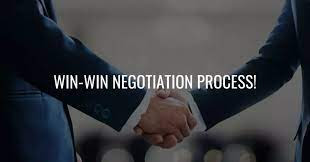More on the Win-Win Technique | Styles of Negotiating
Accomplishing mutual satisfaction using the collaborative Win-Win Style involves emphasis on 3 important activities:
- Building Trust
- Gaining Commitment
- Managing Opposition
Building Trust
By now you must realize that I do not share the cynical view that people are inescapably Greedy or Evil. Without underestimating the difficulty of developing trust in a competitive society, experience has shown me that it can be done.
In Continuing Relationship, the more you place in others, the more they will justify your faith. Convey your belief in their honesty and reliability and you will encourage them to live up to these expectations.
What is the alternative? Start out suspicious and distrustful and surely you will have your prophecy fulfilled. Thus, the only way to save ourselves from the worst may just be to expect the best.
And the best is a Trusting Relationship, in which each party has a firm belief in the honesty and reliability of the other. It's a mutual dependence- a potential alliance to deal with inevitable disagreement.
It's a climate that lays the foundation for transforming conflict into satisfying outcomes.
This mutual Trust is the mainspring of collaborative Win-Win Negotiations. Let's discuss now how and when this relationship can be established. For reasons that will become evident, I have divided the activity of building trust into 2 time frames:
- The Process Stage
- The Formal Event
- The Process Stage
Previously, in distinguishing between the process stage and the formal event, we used the analogy of mental illness. As you will recall, we said that this condition develops- or is it in process- over an extended period.
This measure of time would always precede the formal event, in which the patient is diagnosed and certified as mentally ill. The point made was that a Negotiation is also a continuous process concluding with a formal interaction between the parties.
Therefore, when we say, "The Negotiation will begin on March 5 at 2:00 P.M," we are referring only to the formal event.
This final step in the negotiation process usually takes the form of a personal meeting between the parties, but it could also occur by telephone or even by way of written messages.
Most people persist in thinking that this last stage of the process is the negotiation. However, every concluding formal event is preceded by weeks or months of lead time contained in the process stage of a negotiation.
This concept, which recognized that the formal event is merely the culmination of a lengthy process, has broad application to everyday life. Whether producing a delicious homemade cake or taking a final examination, the success of these events depends upon forethoughts and timely enterprise.
To illustrate further, here's another analogy:
Your daughter and future Son-in-Law wish to have a formal church wedding and a large reception afterward. As the happy Parents of the bride, you agree to make the arrangements and foot the bill.
Although the formal event will encompass only a seven-hour period, the preparation will consume a process stage of 6 months.
Fortunate people are by definition those whom favors- but they are favored because they effectively use their Lead Time during the process stage. In baking a cake, taking a final exam, or planning a wedding, the efforts expended early determined the Final Result.
By the same Token, it is choice, not chance, that determines the ultimate outcome of a Negotiation. Circumstances do not evolve by chance- they are brought about by action or, more often, by inaction during the process stage.
It is then, Prior to the actual Bargaining Event, that attitudes are shaped, confidence established, and expectations developed. Should the negotiation event produce a harvest of discord, the likelihood is that the seeds were sown and cultivated during the process stage. As Benjamin Disraeli said, "We Make our Fortunes and Call them Fate."
Therefore, fortune will favor the person who uses his lead time to send an environment of Trust that will grow and Ripen during the event. This ability, to use the present in anticipation of the Future, will make the difference.
Before the conflict has been formalized is when you can Impact most effectively on the other side's attitude. As I indicated, once the Red light glows on the TV camera, the other side is often on guard and becomes reluctant to expose anything that will increase their Vulnerability.
Before the process has become a Formal Event your actions and behavior are taken at face value. But once an Event has crystallized, anything you do is often viewed as a ploy, a Gambit or a Gimmick, especially in a competitive Environment.
Let me Exaggerate to elaborate upon this point.
You and I meet for the first time during the event, in what could be a prolonged competitive negotiation. Supposing you offer me a cup of coffee and a cigarrete, even though you yourself abstain.
What will my reaction be? If there's no trust in our relationship, I might be thinking, " What's the Motive? Is he trying to soften me up?"
Conceivably, if I were even more suspicious I might think, "This guy is trying to keep me awake at night. Maybe he wants me to get emphysema!"
Obviously, if you made the same offer prior to the event, I would regard it as a gracious gesture from a considerate person.
In short, there are certain actions prior to the event that will give you pluses, goodwill, and credit. Yet during the event in an adversary climate, those same actions will result in minuses, cocked eyebrows, and debits.
Therefore, you must make effective use of the process stage of a negotiation. You cannot afford to wait Until the actual confrontation or event. Use this Lead Time to analyze and diagnose the cause of the potential disagreement. Earlier we said that conflict may arise from differences in experience, information, or the role we have.
Take action before the formal event in these 3 areas to narrow the variance of viewpoint and to build Trust. Constantly hold in your mind a picture of the Trusting, Problem-Solving climate that you would like to see when the event ultimately takes place and take action to bring it about.
Our world may be one of walking paranoia, but Trust is the Universal Lubricant. No one will ever tell you anything worthwhile unless you are trusted with that information.
No one will ever make an agreement with you that they intend to keep unless they trust you. So use the Process stage to build Relationships based upon Trust.
So Readers We will continue in our next Part of:
Do not Forget to Follow my Website for Future Updates.













0 Comments